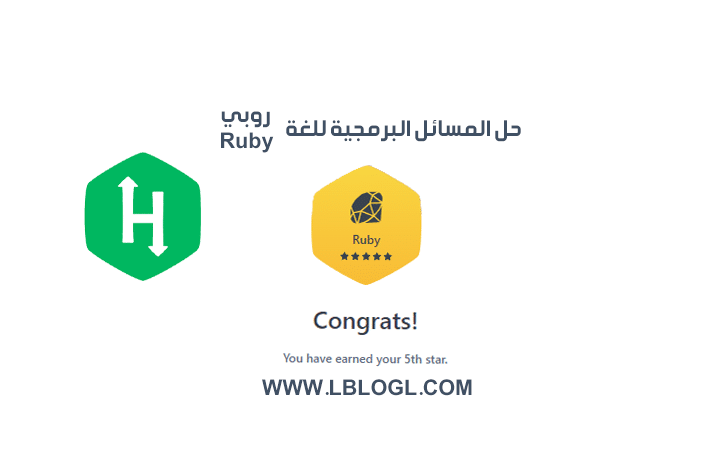
حل المسائل البرمجية للغة Ruby بموقع hackerrank , تعتبر لغة البرمجة Ruby مميزة لإنشاء تطبيقات سطح المكتب والمواقع الثابتة وخدمات معالجة البيانات وحتى أدوات التشغيل الآلي.
- للتسجيل بموقع هكررانك hackerrank قم بالاطلاع على هذه المقالة : شرح موقع hackerrank
- رابط المسائل الخاصة بلغة Ruby على موقع hackerrank : أضغط هنا
1 – Ruby Tutorial – Hello HackerRank!
# Enter your code here. Read input from STDIN. Print output to STDOUT print "Hello HackerRank!!"
2 – Ruby Tutorial – Everything is an Object
# Enter your code here. Read input from STDIN. Print output to STDOUT print self
3 – Ruby Tutorial – Object Method Parameters
# write your code here a.range?(b, c)
4 – Ruby Tutorial – Object Methods
# add your code here number.even?
5 – Ruby Hash – Initialization
# Initialize 3 variables here as explained in the problem statement
empty_hash=Hash.new
default_hash=Hash.new(1)
hackerrank={"simmy" => 100, "vivmbbs" => 200}
6 – Ruby Hash – Each
def iter_hash(hash)
# your code here
hash.each do |key, value|
puts key
puts value
end
end
7 – Ruby Hash – Addition, Deletion, Selection
# Enter your code here.
hackerrank.store(543121, 100)
hackerrank.keep_if { |key, value| key.is_a?(Integer) }
hackerrank.delete_if { |key, value| key % 2 == 0 }
8 – Closures
def block_message_printer
message = "Welcome to Block Message Printer"
if block_given?
yield
end
puts "But in this function/method message is :: #{message}"
end
message = gets
block_message_printer { puts "This message remembers message :: #{message}" }
#####################################################################################
def proc_message_printer(my_proc)
message = "Welcome to Proc Message Printer"
my_proc.call #Call my_proc
puts "But in this function/method message is :: #{message}"
end
my_proc = proc { puts "This message remembers message :: #{message}" }
proc_message_printer(my_proc)
######################################################################################
def lambda_message_printer(my_lambda)
message = "Welcome to Lambda Message Printer"
my_lambda[] #Call my_lambda
puts "But in this function/method message is :: #{message}"
end
my_lambda = -> { puts "This message remembers message :: #{message}" }
lambda_message_printer(my_lambda)
######################################################################################
9 – Partial Applications
combination = -> (n) do
-> (r) do
# https://en.wikipedia.org/wiki/Combination
(n-r+1..n).inject(:*) / (1..r).inject(:*)
end
end
n = gets.to_i
r = gets.to_i
nCr = combination.(n)
puts nCr.(r)
10 – Currying
power_function = -> (x, z) {
(x) ** z
}
base = gets.to_i
raise_to_power = power_function.curry.(base)
power = gets.to_i
puts raise_to_power.(power)
11 – Lazy Evaluation
# Enter your code here. Read input from STDIN. Print output to STDOUT
require 'prime'
require 'prime'
primes = []
puts "[#{Prime.each.lazy.select{|x| x.to_s == x.to_s.reverse}.first(gets.to_i).join(", ")}]"
12 – Procs
def square_of_sum (my_array, proc_square, proc_sum)
sum = proc_sum.call(my_array)
proc_square.call(sum)
end
proc_square_number = proc { |x| x**2 }
proc_sum_array = proc { |n| n.reduce(:+) }
my_array = gets.split().map(&:to_i)
puts square_of_sum(my_array, proc_square_number, proc_sum_array)
13 – Lambdas
# Write a lambda which takes an integer and square it
square = -> (x) { x**2 }
# Write a lambda which takes an integer and increment it by 1
plus_one = -> (x) { x + 1 }
# Write a lambda which takes an integer and multiply it by 2
into_2 = -> (x) {2*x}
# Write a lambda which takes two integers and adds them
adder = -> (a,b) {a + b}
# Write a lambda which takes a hash and returns an array of hash values
values_only = -> (h) { h.values }
input_number_1 = gets.to_i
input_number_2 = gets.to_i
input_hash = eval(gets)
a = square.(input_number_1); b = plus_one.(input_number_2);c = into_2.(input_number_1);
d = adder.(input_number_1, input_number_2);e = values_only.(input_hash)
p a; p b; p c; p d; p e
14 – Ruby Enumerables: ‘any’, ‘all’, ‘none’, and ‘find’
def func_any(hash)
# Check and return true if any key object within the hash is of the type Integer
# If not found, return false.
return hash.any? { |key, value| key.is_a?(Integer) }
end
def func_all(hash)
# Check and return true if all the values within the hash are Integers and are < 10
# If not all values satisfy this, return false.
return hash.all? { |key, value| value.is_a?(Integer) && value < 10}
end
def func_none(hash)
# Check and return true if none of the values within the hash are nil
# If any value contains nil, return false.
return hash.none? { |key, value| value.nil? }
end
def func_find(hash)
# Check and return the first object that satisfies either of the following properties:
# 1. There is a [key, value] pair where the key and value are both Integers and the value is < 20
# 2. There is a [key, value] pair where the key and value are both Strings and the value starts with `a`.
hash.find { |key, value| (key.is_a?(Integer) && value.is_a?(Integer) && value < 20) || (key.is_a?(String) && value.is_a?(String) && value.start_with?("a")) }
end
15 – Ruby – Enumerable – group_by
def group_by_marks(marks, pass_marks)
# your code here
marks.group_by { |student, mark| mark >= pass_marks ? "Passed" : "Failed" }
end
16 – Ruby – Strings – Encoding
# Enter your code here.
def transcode(my_string)
my_string.force_encoding("utf-8")
end
17 – Ruby – Strings – Indexing
def serial_average(string_values)
values = string_values.split('-')
prefix = values[0]
average = (values[1].to_f + values[2].to_f) / 2
formatted_average = format("%.2f", average.round(2))
new_string = prefix + "-" + formatted_average
end
18 – Ruby – Strings – Iteration
# Your code here
def count_multibyte_char(str)
char_count = 0
str.each_char do |character|
char_count += 1 if character.bytesize > 1
end
return char_count
end
19 – Ruby Control Structures – Each
def scoring(array)
# iterate through each of the element in array using *each* and call update_score on
array.each do |user|
user.update_score
end
end
20 – Ruby Control Structures – Unless
def scoring(array)
# update_score of every user in the array unless the user is admin
array.each do |user|
user.update_score unless user.is_admin?
end
end
21 – Ruby Control Structures – Infinite Loop
# Enter your code here. Read input from STDIN. Print output to STDOUT
loop do
coder.practice
if coder.oh_one?
break
end
end
22 – Ruby Control Structures – Until
# Enter your code here. Read input from STDIN. Print output to STDOUT coder.practice until coder.oh_one?
23 – Ruby Control Structures – Case (Bonus Question)
def identify_class(obj)
# write your case control structure here
case obj.class.to_s
when "Hacker"
puts "It's a Hacker!"
when "Submission"
puts "It's a Submission!"
when "TestCase"
puts "It's a TestCase!"
when "Contest"
puts "It's a Contest!"
else
puts "It's an unknown model"
end
end
24 – Blocks
def factorial
yield
end
n = gets.to_i
factorial do
puts (1..n).inject(:*)
end
25 – Ruby – Strings – Methods I
def process_text(array)
array.map {|string| string.strip}.join(" ")
end
26 – Ruby – Strings – Methods II
def mask_article(text, words_array)
words_array.each { |word| text.gsub!(word, strike(word)) }
return text
end
def strike s
"<strike>#{s}</strike>"
end
27 – Ruby Array – Index, Part 2
def neg_pos(arr, index)
# return the element of the array at the position `index` from the end of the list
# Clue : arr[-index]
return arr[-index]
end
def first_element(arr)
# return the first element of the array
return arr.first
end
def last_element(arr)
# return the last element of the array
return arr.last
end
def first_n(arr, n)
# return the first n elements of the array
return arr.take(n)
end
def drop_n(arr, n)
# drop the first n elements of the array and return the rest
return arr.drop(n)
end
28 – Ruby Array – Addition
def end_arr_add(arr, element)
# Add `element` to the end of the Array variable `arr` and return `arr`
return arr.push(element)
end
def begin_arr_add(arr, element)
# Add `element` to the beginning of the Array variable `arr` and return `arr`
return arr.unshift(element)
end
def index_arr_add(arr, index, element)
# Add `element` at position `index` to the Array variable `arr` and return `arr`
return arr.insert(index, element)
end
def index_arr_multiple_add(arr, index)
# add any two elements to the arr at the index
return arr.insert(index, 10, 11)
end
29 – Ruby Array – Deletion
def end_arr_delete(arr)
# delete the element from the end of the array and return the deleted element
return arr.pop
end
def start_arr_delete(arr)
# delete the element at the beginning of the array and return the deleted element
return arr.shift
end
def delete_at_arr(arr, index)
# delete the element at the position #index
arr.delete_at(index)
end
def delete_all(arr, val)
# delete all the elements of the array where element = val
arr.delete(val)
end
30 – Ruby Array – Initialization
# Initialize 3 variables here as explained in the problem statement array = Array.new() array_1 = Array.new(1) array_2 = Array.new(2, 10)
31 – Ruby Array – Index, Part 1
def element_at(arr, index)
# return the element of the Array variable `arr` at the position `index`
# arr.at(index) # or
# arr[index]
return arr[index]
end
def inclusive_range(arr, start_pos, end_pos)
# return the elements of the Array variable `arr` between the start_pos and end_pos (both inclusive)
return arr[start_pos..end_pos]
end
def non_inclusive_range(arr, start_pos, end_pos)
# return the elements of the Array variable `arr`, start_pos inclusive and end_pos exclusive
return arr[start_pos...end_pos]
end
def start_and_length(arr, start_pos, length)
# return `length` elements of the Array variable `arr` starting from `start_pos`
return arr[start_pos, length]
end
32 – Ruby Array – Selection
def select_arr(arr)
# select and return all odd numbers from the Array variable `arr`
return arr.select {|a| a % 2 != 0}
end
def reject_arr(arr)
# reject all elements which are divisible by 3
arr.reject {|a| a % 3 == 0}
end
def delete_arr(arr)
# delete all negative elements
arr.reject {|a| a < 0}
end
def keep_arr(arr)
# keep all non negative elements ( >= 0)
arr.select {|a| a >= 0}
end
33 – Ruby – Methods – Arguments
# Your code here
def take(arr, start=1)
return arr[start..-1]
end
34 – Ruby – Methods – Variable Arguments
# Your code here
def full_name(first_name, *middle_names, last_name)
full_name = ''
full_name += first_name
middle_names.each do |name|
full_name += " "
full_name += name
end
full_name += " "
full_name += last_name
end
35 – Ruby – Methods – Keyword Arguments
def convert_temp(temp, input_scale: , output_scale: 'celsius')
return temp if input_scale == output_scale
#Convert everything to Celsius
case input_scale
when "kelvin"
temp = temp - 273.15
when "fahrenheit"
temp = (temp-32) * (5.0/9.0)
end
case output_scale
when "celsius"
return temp
when "fahrenheit"
return temp * (9.0/5.0) + 32
when "kelvin"
return temp + 273.15
end
end
| مقالات قد تهمك |



